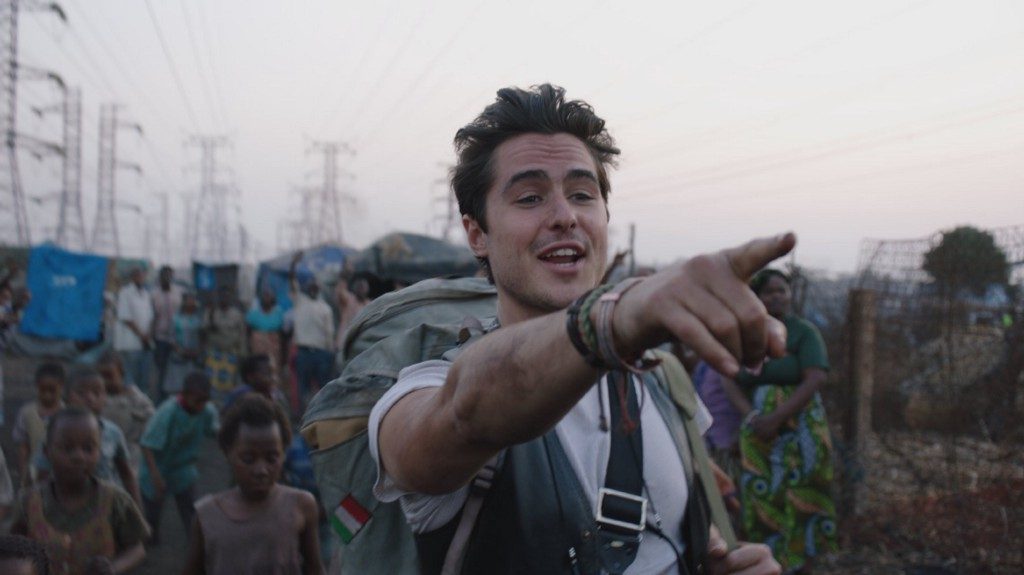Bronwen Hughes is a Canadian-British film director based in New York and Hollywood. “The Journey is the Destination” is her fourth feature film. Hughes’ previous films include “Forces of Nature,” “Harriet the Spy,” and “Stander,” the latter of which Hughes was nominated for Best Director at the 25th Genie Awards. Hughes has also directed episodes of TV series including “Breaking Bad,” “Hung,” and “The L Word.”
“The Journey is the Destination” will premiere at the 2016 Toronto International Film Festival on September 14.
W&H: Describe the film for us in your own words.
BH: “The Journey is the Destination” is the story of Dan Eldon, based on his hyper-visual journals. We considered those journal books the map to making the film, and invented a moving-picture version of that visual language. By the age of 22, Dan (played by Ben Schnetzer) had traveled to over 40 countries, road-tripped through Africa with a posse of international teens, hand-delivered the money they’d raised to a refugee camp, been hired as the youngest photojournalist to work for Reuters, and fallen in love. Phew!
W&H: What drew you to this story?
BH: It was as if Dan had done all of the things that I had tried to do on a small scale — see the world, change the world, make art to tell about [changing the world]— but he had done them to the max.
W&H: What do you want people to think about when they are leaving the theater?
BH: I want them to ask themselves, “What the heck am I doing with my short time on this planet, and why am I wasting time?!” In fact, most people ask themselves that same question after stumbling upon Dan’s book of journal entries, so we’re hoping the film has an even bigger ripple effect.
W&H: What was the biggest challenge in making the film?
BH: There is a really large, global fan following of Dan’s story. but it fits no box of precedent when it comes to financing. So it has been most frustrating to hear, so many times, “This is exactly the kind of film I want to make!… But, I’m so sorry, my company will only finance genre pictures.” Grow a spine, people!
W&H: How did you get your film funded? Share some insights into how you got the film made.
BH: Luckily, our film was ultimately financed by a small group of visionaries who decided this story must be told. They took the leap, where others waited to see who else was leaping. Applause and gracious thanks to those who take the first leaps!
W&H: What does it mean for you to have your film play at TIFF?
BH: TIFF was our number one dream for the premiere of this film. It is the city and festival where people who love films come to watch. Regular people, real people, not just industry insiders.
Since the beginning of the festival, and since the beginning of my own film education, this is the dominant feeling of TIFF: a rabid need and passion to see great films. Let’s hope “The Journey is the Destination” is one of them.
W&H: What’s the best and worst advice you’ve received?
BH: Filmmaking is a chemical combustion, so no one knows what will succeed. Only passion and perseverance can get a film made in the first place. Only a never-ending sensitivity to emotional cues in performances and viewer reactions can make it a better one. Be sure of yourself… but then don’t be too sure of yourself. Ha!
W&H: What advice do you have for other female directors?
BH: I believe in eradicating “female director” as a category, in the same way that “male director”does not exist. [Female directors are] not a uniform group.
I never kept a tally of the genders of the great filmmakers that made me want to make films in the first place. I was oblivious, which, in retrospect, seems kind of healthy. I admire unique voices when they are loud and crystal clear.
Filmmakers are a bunch of strange, creative people, and no two are alike.
There is only one goal for any aspiring filmmaker, and my one piece of advice — make better films, whoever you are, and fight to stay true to your voice. To obsess over percentages and numbers takes away your ability to do that.
W&H: Name your favorite woman-directed film and why.
BH: I have a massive, long list of favorite films, which evolves constantly.
W&H: Have you seen opportunities for women filmmakers increase over the last year due to the increased attention paid to the issue? If someone asked you what you thought needed to be done to get women more opportunities to direct, what would be your answer?
BH: I have the same advice — make good films that can’t be ignored. It’s far from easy, but it’s the way to make the shift going forward. Only forward matters.
I think technology now— cheap, accessible, and [available on] your laptop — makes the evidence of better filmmaking, the building of a body of work, the biggest and best opportunity for anyone of any gender who is trying to become a professional filmmaker.







